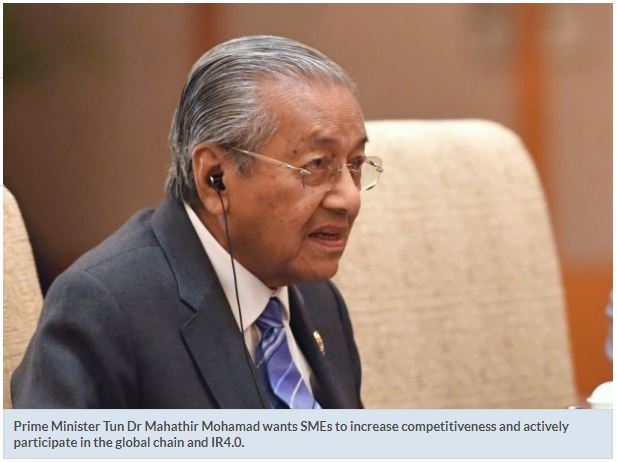Malaysia: Govt allocating significant resources to support SMEs
KUALA LUMPUR: The Pakatan Harapan government is holding to its 14th General Election’s (GE14) pledges since its historic win nearly a year ago by allocating significant resources to support the growth of small and medium enterprises (SMEs) and encouraging their technological adoption.
While the SME gross domestic product (GDP) growth is estimated to be sustained at 5.8% in 2018 and 2019, the government has urged SMEs to embrace research and development, technology and explore new growth areas in the digital economy in the Fourth Industrial Revolution (IR4.0) for more sustainable growth.
Prime Minister Tun Dr Mahathir Mohamad wants SMEs to increase competitiveness and actively participate in the global chain and IR4.0.
For Malaysia to become a developed nation, he said the IR4.0 is a crucial step to leap forward, especially for the manufacturing industry, of which the SME manufacturing sector’s contribution to the GDP is targeted to increase to 7% by 2020 from the current 5.8%.
Meanwhile, the Entrepreneur Develop-ment Ministry (MED) through SME Corp Malaysia will also look into new trends that will accelerate SME’s growth such as megatrends and IR4.0.
Responding to Bernama via an email, SME Corp said based on the SME Integrated Plan of Action, in 2019 the government has allocated RM13.02bil to undertake 162 SME development programmes through 17 ministries and more than 60 agencies.
A two-pronged strategy will be undertaken for sustainable and inclusive development, which ramps up the creation of high growth and innovative technologies, as well as increasing the contribution micro-enterprises owned by the bottom 40% of household income (B40) group to the economy.
The government, during the one-year period, has also identified main sub-sectors that will further accelerate the economic growth, namely the rail industry, medical devices, aerospace, automotive, digital economy, biotechnology and renewable energy.
Manufacturers and service providers in these sub-sectors have bigger potentials and capabilities to diversify their products and services towards more complex and higher value projects, which in turn, will generate a higher economic return to the GDP.
Among the highlights of the past one year was the implementation of SME development programmes across various key economic sectors by the National Entrepreneur Development Council (previously known as the National SME Development Council).
Eight broad measures were endorsed to boost SME GDP growth to reach 41% by 2020.
They included intensifying digitalisation among SMEs; enhancing SMEs integration in the supply chain; supporting more high-growth SMEs with relevant incentives; facilitating alternative financing mechanism; enhancing SMEs participation in the tourism industry chain; implementing measures to drive growth, strengthen uptake; and promoting export of homegrown payment gateway and fin-tech by local SMEs.
Another highlight was the IR4.0 initiative.
The Industry4WRD National Policy on Industry 4.0, launched by the government recently, will enable SMEs to be agile and adaptable to meet the challenges posed by IR4.0.
As part of the policy, Dr Mahathir said the readiness assessment programme will further assist SMEs to measure their gaps and preparedness, in order to guide their adoption of Industry 4.0 technologies.
Besides IR4.0, the government also aims to develop 30 new SME players by 2020 to add into the current 20 companies for aerospace manufacturing.
According to the National Aerospace Industry Coordinating Office, 48% or RM6.6bil of the aerospace industry’s revenue in 2017 came from the aerospace manufacturing segment, followed by 46% from the maintenance, repairs and overhaul segment, and the remaining from the engineering and design services segment. — Bernama
Meanwhile, Bank Negara Malaysia (BNM) also aims to improve cooperation with the finance industry to ensure entrepreneurs who are qualified and in need can obtain financing.
Assistant governor Adnan Zaylani Mohamad Zahid said SMEs are an important customer segment for financial institutions and account for 87 % of business financing.
He said in 2018, more than 123,000 SME financing applications were approved and on the average, three out of four applications were granted loans, and as much as RM307 billion in financing was disbursed to SMEs last year.
Moving forward, MED is confident of creating 200,000 new entrepreneurs during the current five-year term of the PH government.
The target is achievable due to the positive response as 24,000 new entrepreneurs had been registered during the first one-year period of the PH administration.
They were registered with MED’s agencies such as TEKUN Nasional and SME Corp, with some undergoing the ‘Professional Training and Education for Growing Entrepreneurs’ (Protege) programme which was rebranded from the 1Malaysia Training Scheme.
— BERNAMA
Source: https://www.thestar.com.my/business/business-news/2019/05/02/govt–allocating-significant-resources-to-support-smes/#R6bPgVZT1o2Oebwi.99


 Thailand
Thailand




